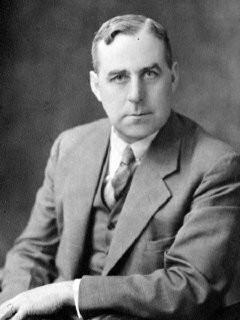
William Raymond "Toby" Sexsmith was a Canadian politician and ice hockey administrator. He was elected three times as a Progressive Conservative Party member of the Legislative Assembly of Manitoba representing the Portage la Prairie riding from 1933 to 1943. He served as president of the Manitoba Amateur Hockey Association from 1921 to 1923, and sat on the association's executive committee for 25 years. He served as president of the Canadian Amateur Hockey Association (CAHA) from 1922 to 1924, and set a precedent that future CAHA presidents would also be given two-year terms.

The Canadian Amateur Hockey Association was the national governing body of amateur ice hockey in Canada from 1914 until 1994, when it merged with Hockey Canada. Its jurisdiction included senior ice hockey leagues and the Allan Cup, junior ice hockey leagues and the Memorial Cup, amateur minor ice hockey leagues in Canada, and choosing the representative of the Canada men's national ice hockey team.

Claude Copeland Robinson was a Canadian ice hockey and sports executive. After winning an intermediate-level championship as captain of the Winnipeg Victorias in 1905, he served as secretary-treasurer and as vice-president of the Victorias. He coached the Victorias to a Manitoba Hockey League championship in 1909, and felt that his team could have competed for the newly established Allan Cup, despite that challenges from senior ice hockey teams were accepted only from Eastern Canada at the time. The Victorias won the Allan Cup by default in 1911, when the Toronto St. Michael's Majors refused to play, then successfully defended four challenges for the trophy.

George Samuel Dudley was a Canadian ice hockey administrator. He joined the Ontario Hockey Association (OHA) executive in 1928, served as its president from 1934 to 1936, and as its treasurer from 1936 to 1960. He was elected to Canadian Amateur Hockey Association (CAHA) executive in 1936, served as its president from 1940 to 1942, as its secretary from 1945 to 1947, and as its secretary-manager from 1947 to 1960. He was secretary of the International Ice Hockey Association from 1945 to 1947, and was later vice-president of the International Ice Hockey Federation (IIHF) from 1957 to 1960. He was expected to become the next president of the IIHF before his death. He graduated from Osgoode Hall Law School in 1917 then practiced law for 43 years as the town solicitor for Midland, Ontario.
The Port Arthur Bearcats were a senior amateur ice hockey team based in Port Arthur, Ontario, Canada – now part of the city of Thunder Bay – from the early 1900s until 1970. Before settling on the nickname of Bearcats, the Port Arthur team played several seasons with unofficial generic names applied by fans and sportswriters, such as the Port Arthur Ports, Port Arthur Hockey Club, and the Port Arthur Seniors.

Allan Wilfrid Pickard was a Canadian ice hockey administrator, who served as president of the Canadian Amateur Hockey Association (CAHA) from 1947 to 1950. When Canada opted out of the 1947 Ice Hockey World Championships and decided not to participate in the 1948 Winter Olympics, Pickard felt that Canada was obliged to send a team due to its place as a top hockey nation, and nominated the Ottawa RCAF Flyers who won the gold medal for Canada and lived up to the requirements of the Olympic Oath as amateurs. Despite disagreement with the International Olympic Committee, he sought for the International Ice Hockey Federation to adopt the CAHA definition of amateur in the face of increasing difficulty in selecting the Canada men's national ice hockey team.
The Wheat City Hockey Club was an early amateur ice hockey club in Brandon, Manitoba. The club fielded senior-level, junior and intermediate teams from 1898. The club fielded teams in the Manitoba & Northwestern Hockey Association, followed by the Manitoba Hockey Association, the Manitoba Professional Hockey League (MPHL) and the early Manitoba Hockey League.
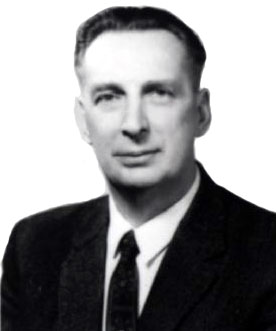
Hanson Taylor Dowell was a Canadian ice hockey administrator and politician. He served as president of the Canadian Amateur Hockey Association from 1945 to 1947, and was the first person from the Maritimes to serve on the national executive. He sought to have the Canadian definition of amateur recognized at the World Championships and the Olympic Games for the benefit of Canada's national team, and negotiated the merger of the International Ice Hockey Association into the Ligue Internationale de Hockey sur Glace. He served as president of the Maritime Amateur Hockey Association from 1936 to 1940, and later as treasurer of the Maritimes and the Nova Scotia Hockey Associations for a combined 30 years.
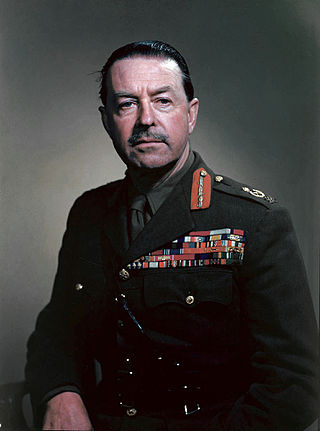
The Alexander Cup was the championship trophy for the Major Series of senior ice hockey in the Canadian Amateur Hockey Association from 1950 to 1954. The trophy was presented by its namesake, the Viscount Alexander as the 17th Governor General of Canada.
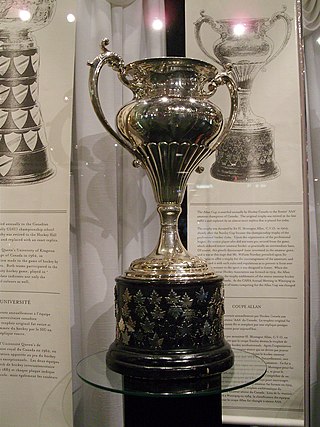
The 1936 Allan Cup the Canadian senior ice hockey championship for the 1935–36 season. The 1936 championship was the 29th time the Allan Cup had been awarded.

The 1935 Allan Cup was the senior ice hockey championship of the Canadian Amateur Hockey Association (CAHA) for the 1934–35 season. In the best-of-three final, the Halifax Wolverines defeated the Port Arthur Bearcats two games to none.

William George Hardy was a Canadian professor, writer, and ice hockey administrator. He lectured on the Classics at the University of Alberta from 1922 to 1964, and served as president of the Canadian Authors Association. He was an administrator of Canadian and international ice hockey, and served as president of the Alberta Amateur Hockey Association, the Canadian Amateur Hockey Association (CAHA), the International Ice Hockey Association, and the International Ice Hockey Federation.

William Alexander Fry was a Canadian sports administrator and newspaper publisher. Fry founded the Dunnville Chronicle in 1896, managed local hockey and baseball teams in the 1910s, then served as president of the Ontario Hockey Association (OHA) from 1922 to 1924. At the national level, he was president of the Canadian Amateur Hockey Association (CAHA) from 1928 to 1930, was a Canadian Olympic Committee member and British Empire Games committee member from 1927 to 1938, and served as president of the Amateur Athletic Union of Canada from 1934 to 1936.
The International Ice Hockey Association was a governing body for international ice hockey. It was established in 1940 when the Canadian Amateur Hockey Association wanted more control over international hockey, and was in disagreement with the definition of amateur used by the International Olympic Committee. The Amateur Hockey Association of the United States co-founded the association, with the British Ice Hockey Association joining later. The association oversaw the relationships between the National Hockey League, and leagues within the national amateur associations. W. G. Hardy served as its president, and planned for an amateur hockey World Series after World War II. The association was merged into the Ligue Internationale de Hockey sur Glace in 1947.
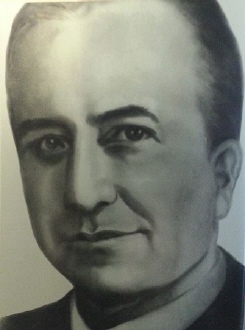
Cecil Charles Duncan was a Canadian ice hockey administrator. He served as president of the Canadian Amateur Hockey Association (CAHA) from 1936 to 1938 and led reforms towards semi-professionalism in ice hockey in Canada. He served as chairman of the CAHA committee which proposed a new definition of amateur to eliminate what it called "shamateurism", in the wake of Canada's struggles in ice hockey at the 1936 Winter Olympics. He negotiated a series of agreements to protect the CAHA's interests, and to develop relationships with all other areas of the world where hockey was played. The agreements allowed the CAHA to become independent of the Amateur Athletic Union of Canada which wanted to keep the old definition of pure amateurism. Duncan's reforms also returned the CAHA to affluence after four years of deficits during the Great Depression and increased player registrations in Canada.
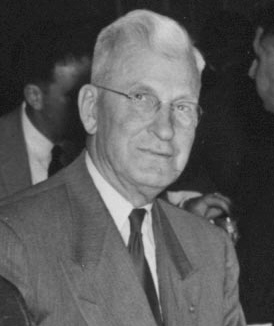
John Welch Hamilton was a Canadian sports executive. He served as president of the Canadian Amateur Hockey Association (CAHA) from 1930 to 1932, president of the Amateur Athletic Union of Canada from 1936 to 1938, and was a member of the Canadian Olympic Committee for 17 years. His leadership of the CAHA and the AAU of C coincided with efforts to maintain amateurism and combat growing professionalism in sport. He appointed a committee to establish better relations between the CAHA and professional leagues, and praised the players and teams for quality hockey and growth of the amateur game in Canada despite the competition. He favoured professionals in one sport playing as amateurs in another, and took charge of the AAU of C at a time when the CAHA, the Canadian Amateur Basketball Association, and the Canadian Amateur Lacrosse Association challenged the definition of amateur, and later broke away from the AAU of C which wanted to hold onto purist ideals of amateurism.

Edward Albert Gilroy was a Canadian ice hockey administrator. He served as president of the Manitoba Amateur Hockey Association (MAHA) from 1927 to 1934, and the Canadian Amateur Hockey Association (CAHA) from 1934 to 1936. In Manitoba, he sought to expand senior ice hockey and establish co-operation between teams and owners of the Winnipeg Amphitheatre on schedules and reducing travel costs. He wanted all players aged 21 and younger to remain in junior ice hockey and began to negotiate with professional teams to refrain from signing them to contracts. His seven years as leader of the MAHA was the longest tenure for a president at the time, during which he oversaw continued growth of the association and improvement of finances.

The Maritime Amateur Hockey Association (MAHA) was a governing body for amateur ice hockey in the Maritimes of Canada. It was a branch member of the Canadian Amateur Hockey Association from 1928 to 1974, with its jurisdiction including the provinces of New Brunswick, Nova Scotia and Prince Edward Island. The MAHA operated leagues for senior ice hockey which competed for the Allan Cup, and leagues for junior ice hockey which competed for the Memorial Cup. The New Brunswick Amateur Hockey Association separated from the MAHA in 1968, and the MAHA ceased to exist after the Nova Scotia Hockey Association and Prince Edward Island Hockey Association were established in 1974.

Frank Chapin Greenleaf was a Canadian sports administrator. He served as president of the Canadian Amateur Hockey Association and the Quebec Amateur Hockey Association, and was an executive in the Quebec branch of the Amateur Athletic Union of Canada. He presided over amateur hockey when the Canadian Amateur Hockey Association wanted to end the raiding of its rosters by foreign teams and to prevent a geographic shift in talent by imposing a residency rule for players. Greenleaf negotiated for a North American senior ice hockey championship that saw the Allan Cup winner play the amateur champion of the United States. He served as an executive member of multiple amateur hockey leagues in Montreal and was one of the founders of the Mount Royal Junior Hockey League.

Frederick Paul Henry Marples was a Canadian sports executive in ice hockey and athletics. He was president of the Winnipeg Monarchs team which won Winnipeg Amateur Hockey League championships in 1914 and 1915, and the Allan Cup as senior ice hockey champions of Canada. His operation of a reserve team to support the Monarchs led to debates on player eligibility for the Allan Cup and calls for a national governing body of hockey. As the secretary-treasurer of the Winnipeg Amateur Hockey League, he helped establish both the Manitoba Amateur Hockey Association (MAHA) and the Canadian Amateur Hockey Association (CAHA) in 1914; then served as secretary-treasurer of the MAHA from 1914 to until 1934, and as secretary of the CAHA from 1926 to 1945. He sought to grow the game in rural regions of Manitoba, promote minor ice hockey as a source of future senior players, to keep players in junior ice hockey until age 21, and was against the exodus of amateur players to professional teams.
















